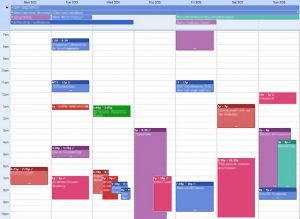
Flickr User: Elf Sternberg
Depending on your high school rigor and schedule, you may be a bit culture-shocked when it comes to college studying. College classes are naturally more difficult than high school. That shouldn’t scare you, it should make sense. As each year progresses, you have more knowledge and are ready for more challenging courses. You spent many hours in class in high school with a teacher at your call most of the time. In college, most of the comprehending, learning, and memorizing the material will be done outside of class. You will be introduced to the content in class and take notes, but how many people can absorb the information, comprehend, and store it right then? Not many. This will require studying. Not the skim your notes, read the first paragraph, and call it good studying. We have tips for how to build an effective and thorough study schedule.
Know Your Overall Schedule
Plan out your schedule including class times, work, activity meetings, intramurals, sleep, or whatever limitations you have on your time. This will help show you what free blocks you have in your schedule to fit in when you can study.
Know the Material Tested
This will be important to know for when you’re studying. Know the chapters, sections, and topics that will be covered on tests. Additionally, know the test format. Is it multiple-choice, short answer? This will determine how you prepare and also how much.

Gather Materials
Eliminate inefficiency by making a list of the materials you will need before you start your studying session. Some examples are:
- Syllabus
- Notebook
- Pens/Highlighters
- Note Cards
- Laptop
- Study Guides
- Your Notes
- Textbook
- Sticky Notes
- Page Markers
Create Your Study Schedule
This should include a very detailed plan of what time constraints you have. If it is a super important timeline, such as finals, the more detailed the better in order to balance your health and well-being. Schedule things you think are small like eating, sleeping, showering, and so on. This way you have a very realistic picture of when you can fit in studying. It is important to schedule your regular activities like exercise, sleeping, and eating so you don’t make excuses and skip those. Many college students get too little sleep and rely on caffeine, while you’ll probably do this once or twice, it is a very detrimental cycle. Your brain does not function properly without sleep, so there is a good chance you won’t be absorbing that information at 3 AM to remember for the test at 7 AM. Take care of your body and pay attention to it.
Know when you are most productive. If you think really well early in the morning at 8 AM or in the evening at 8 PM, schedule your studying for that time frame.
Schedule in increments with specific topics. Scheduling a 4-hour block of time with ”microeconomics” is pretty ambiguous. You would be better off scheduling a 30-minute time session focused on learning about supply and demand.
Along the same vein as above, take breaks. If you aren’t focused after hitting the books for an hour, take a break. Stand up, stretch, walk around, drink water, do something to relieve yourself and then get back to it.
Ask friends ahead of time if you are going to study together. Merging your schedules together can be tricky, so be prepared with their available time with you start studying.
Do you have any more study tips? Tell us in the comments!






